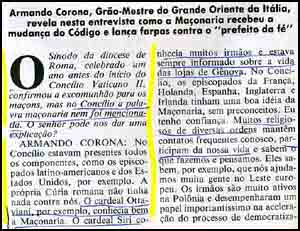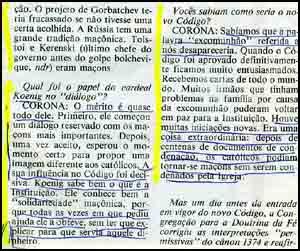 |
Documents for your files

PROGRESSIVIST DOCUMENT OF THE WEEK
Card. Koenig Often Received Money from the Masonry
After the promulgation of the new Code of Canon Law (1983), many commentaries tried to explain why the traditional condemnation against Masonry was set aside. The Italian magazine 30 Giorni conducted an interview with Italian Freemasonry's Grand Master Armando Corona. In it Corona reveals the association of several Catholic Prelates with his organization. Among them is Cardinal Franz Koenig, Archbishop of Vienna, who allegedly received money often from Freemasonry.
At right, the photo of Armando Corona, and photocopies of the interview in 30 Dias; below, our translation from Portuguese of the questions and answers highlighted in yellow.
|
30 Dias - The Synod of the Diocese of Rome that met one year before Vatican II confirmed the excommunication of Masons, but at the Council the word Masonry was not even mentioned. Can you explain that for us?
Armando Corona - All the members were present at the Council, such as for example the episcopates of Latin America and the United States. The Roman Curia itself had nothing against us. Cardinal Ottaviani, for example, knew Freemasonry quite well. Cardinal Siri knew many of our brothers, and was always informed about the life of the Lodges in Genoa. At the Council, the episcopates of France, Holland, Spain, England and Ireland had a good idea of Masonry, without prejudices, I am confident.
Many religious men of various Orders maintain frequent contacts with us, share our life, and know what we do and think. They know, for example, that we help many people in the European East. The brothers [of Freemasonry] are very active in Poland, and played a most important role in speeding up of the process of democratization. Gorbatchev's project would have failed without a certain good reception. Russia has a long Masonic tradition. Tolstoy and Kerensky (the last head of government before the Bolshevik coup de force) were Masons.
30 Days - What was the role of Cardinal Koenig in the 'dialogue'?
Corona - He deserves almost all the credit. First, he started a confidential dialogue with the most important Masons. Once it was accepted, he waited for the right moment to propose a different image of Masonry to Catholics. His influence in the Code was decisive. Koenig is well aware of what the Institution is. He has a good understanding of Masonic "solidarity," because every time he asked help from us, he received it, without having to explain the purpose for that money.
30 Dias - Did you know how the new Code would be?
Corona - We knew that the word "excommunication" with regard to us would disappear. When the Code was definitively approved, we were very enthused. We received letters from all over the world. Many brothers who had problems in their families because of the excommunication could return in peace to the Institution. There were many new initiations. It was an extraordinary thing: after hundreds of condemnations, Catholics could become Masons without being condemned by the Church.
("O Nosso Adversário é Ratzinger," interview granted by Armando Corona to Antonio Socci, in 30 Dias, Janeiro 1990, pp. 56-57)
|



|

Posted on December 2, 2006

Related Topics of Interest
 Pope Wojtyla Rewarded by Freemasonry Pope Wojtyla Rewarded by Freemasonry
 Kung Applaudes the SecrThe
'Reconciliation' of the Two Benedictset Organization that Prepared Vatican II Kung Applaudes the SecrThe
'Reconciliation' of the Two Benedictset Organization that Prepared Vatican II
 Wojtyla Influenced by Theosophist Blavatsky Wojtyla Influenced by Theosophist Blavatsky
 Satanism and the 'Incompetent Roman Curia' Satanism and the 'Incompetent Roman Curia'
 Satanism on the Rise Satanism on the Rise
 The Da Vinci Code The Da Vinci Code
 The 'Reconciliation' of the Two Benedicts The 'Reconciliation' of the Two Benedicts
 Fr. Ratzinger Under Suspicion of Heresy Fr. Ratzinger Under Suspicion of Heresy

|
Related Works of Interest
|
Documents | Home | Books | CDs | Search | Contact Us | Donate

© 2002- Tradition in Action, Inc. All Rights Reserved
|
 |
|
